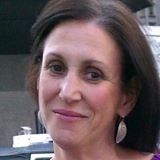 |
| Jessica Baron (Jessica Baron) |
Jessica Baron wears of lot of hats. Mother, Musician, Songwriter, Music Educator, Empath, Child Development Specialist, Friend. but it is her vision of the future of education that is so compelling and makes one sit up and take notice. Recently I had the good fortune to interview her and came away being so inspired and full of hope for the future of education for our kids if the powers that be will let her influence that future. She is the Founder and Executive Director of Guitars in the Classroom which she launched in 1998 and she has made it her mission to devote herself to "making music more accessible for teachers and students ever since." The deal is that through music kids can more easily learn math and language and pretty much any subject while gaining self confidence, having fun (yes fun) at school and elevating those blessed test scores at the same time. This is not just some wild musing but backed up by much research at very academic, very prestigious schools. Check out the Brainvolts website at Northwestern University at the end of the story.
According to GITC's mission statement: "Our free, regionally based programs train, equip and empower educators to sing, play guitar and ukulele, teach and lead songs as well as compose lyrics for learning with their students. Infusing academics with music helps every kind of learner become more actively engaged, creative and successful in school, builds classroom community and provides musical access for every child."
But Jessica explains it much better than I ever could.
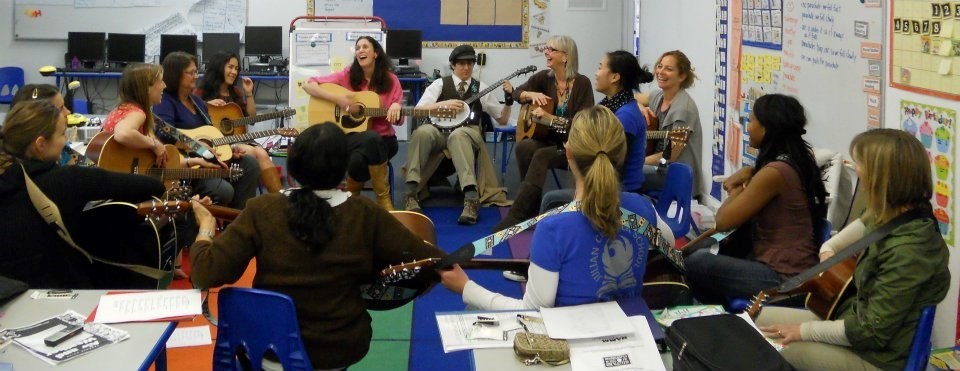 |
| Jessica and her son, Elias Turner are jamming with a group of GITC classroom teachers. Elias is playing bango to her left (Jessica Baron) |
What inspired you to start GITC? Your aha moment?
"There was no aha moment. I've been a musician my entire life. I had realized kids were going to be increasingly in deeper trouble with the combination of stress on families financially and depletion of arts in education. There was a drive towards quantifying success in schools and it looked like kids were going to get lost in the shuffle.
That was 1989.
At that point I was finishing a degree in clinical psychology and teaching human development classes at Crossroads in Santa Monica. Privately I was teaching guitar and voice.
In 1998, my husband and I were living in Santa Cruz with our son and I was teaching music in schools. A number of teachers had made comments that they were envious of the level of excitement of kids in my music classroom. They wanted to become more musical and I thought, we can do that. There must be a way to help classroom teachers become more musical with a musical teaching strategy across the curriculum.
At the time there was a gap between arts education and academic curriculum. I stepped into that gap and asked what would happen if we figured out the way to teach academics with music. People thought I was crazy.
Early childhood teachers had done this forever but the practice thinned out after K-1. A handful of teachers would use a song here or there in higher grades. But only the rare teacher knew how to engage students and teach through singing.
Many of us who are older fondly remember that special one who played guitar and got us to sing to learn social studies or grammar. I wondered if we could help many more teachers learn to do this and to expand the teaching repertoire across all the academics.
What was your first breakthrough?
"I got a small grant to start a pilot program and I put it out there to the general public to see if someone wanted to try this with me as an experiment. I heard from a teacher in a little town in central California called Taft. She was a very active Bluegrass musician and a master level kindergarten teacher. So Fender, the old guard leaders running Fender, underwrote that first project and supplied instruments and salaries and it was ridiculously successful. All elementary teachers learned music and how to teach with it and that teacher won an award in her county for what she did.
The children and teachers wrote songs about their families' experiences in the oil fields. We started expanding and I tried it myself in the Santa Cruz area and that program is still having an affect on the children. It has now morphed into other things. The whole focus of this work is grass roots. It doesn't operate according to any corporate plan. It's different from Kinder Music and Music Together that have fixed curriculum and modules and operate as "for profit" businesses that charge trainers to learn the work and charge parents to bring their children. We are grassroots and open access.
Our programs are open to all teachers for free. The focus for the teachers is for them to unlock their own creative nature and then pass it on to their students. To learn to make music along the same developmental lines their students will follow. As they acquire the basic musical skills they can immediately transmit them into their own classrooms. We have 37 different people around the country who run our classes."
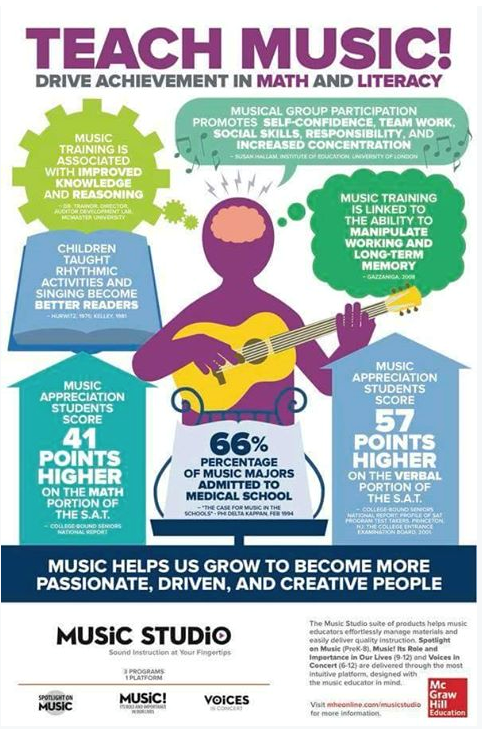 |
| Benefits chart of teaching music (Jessica Baron) |
What do you have to say to parents about the value of music for their children, especially at a young age?
"Between birth and six years of age, making music is essential to child development. The latest studies show a profound correlation between a child's ability to feel and produce a steady beat with the ability to read. Rhythm is the sonic framework for acquiring spoken and written language."
Everything builds from a strong foundation. If a child does not experience music in their formative years, they are approaching new and higher level tasks with a deficit and the work becomes more critical. As the access to music increases in a child's education, so does their ability to understand and embrace other kinds of learning. And it applies across the board. It is true in every area of development.
All other learning, in my point of view, is built upon a scaffold of language and math We can't express and understand higher thought without these skills. One needs vocabulary to understand and express our experiences as human beings. One needs math to give us logic so we can begin to analyze and understand the mechanical nature of life.
If we can help children acquire and develop their language skills including hearing and listening skills then we help set those kids up to progress as they grow and learn. In addition to giving us language, music is also inherently mathematical. Sounds are organized into beats, notes, measures, rhythms and rhythm patterns, time signatures. Because of this, the young musician learns to apply counting, basic math operations and measuring skills to playing an instrument and singing. This is mathematics in its simplest and most enjoyable form! When the classroom teacher understands how to deploy music for learning math and more, his or her students can develop an intuitive relationship with numbers that will last a lifetime. What a gift! I would like every teacher to have access to this training so that all children can develop a creative, natural relationship with math and language through music.
If we deprive kids of music in those formative years we are crippling them. It's not just a matter of joy, it's a matter of helping them function and succeed in the world. The power of music is so strong and the presence of music in life is so ubiquitous that it is a constantly present, natural medium for learning. I think it's the magic ingredient. I get emails and letters from people every day that this is what is making the difference."
What do you have to say to teachers about getting involved and what it means to their students?
"Teachers may not think of themselves as musical people yet but that is simply because they have not had access to a kind of training that makes music simple, enjoyable and rewarding. Every teacher is musical and has the capacity to do this, no matter what ideas they have about themselves. Our work exists to throw those ideas out and start fresh without any judgement. We want to correct the injustice that has happened to so many people when they were compared unfavorably to others, embarrassed or teased. Music is not a commodity but a form of human expression and we want to help teachers make it a part of every child's life as well as their own."
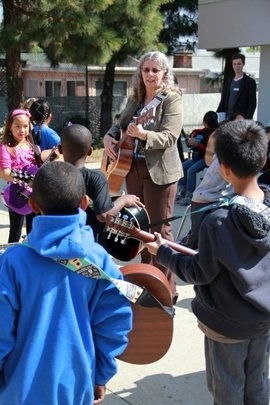 |
| Patty Bertram and her students doing math (globalgiving.org) |
What is one of the most rewarding stories of the past years of sharing the gift of music with students, teachers and their families?
"Teacher Patty Bertram came from a family with very little money and there were no musical opportunities in her childhood. As a young woman she joined the military and became a specialist in math and science. She went into education later.
One day she came across an announcement in the school district for a free class with no musical experience required. She was funny when she called to register for class. She told me, "I can't sing in tune and I can't keep time, but I think every child should have the opportunity to learn music. I want to do something about it." At her school, there was music education program for students in grades kinder thru 3. She asked, "Can you teach me? Is there hope for me?" Of course you know how I answered.
Patty signed up and fell in love with making music. So we placed the teacher training program for the region at her elementary school the following year. Teachers from all over her area enrolled and we had a huge class. Patty flourished and that year she and her husband started making the rounds at garage sales looking for classroom instruments. They acquired many drums and some beat up guitars.
Guitars in the Classroom and our sponsors worked with Patty to make sure there was an instrument for every child to play. She used beat work on the drums to teach her students to add and multiply. She employed the power of music to engage her 3rd graders for science, too, realizing she could motivate them to get their work done early so they could play their instruments together at the end of the day.
Patty used our Hawaiian open tuning method on guitar to get every kid strumming and playing and the following year she switched to ukuleles in her class because they only have 4 strings and are easy to store. She believes so strongly in the power of music to engage that she started her own weekly song circle for teachers.
(NOTE: You can see Patty in Action at 1 minute 25 seconds in the Guitars Make a Difference Video link below.)
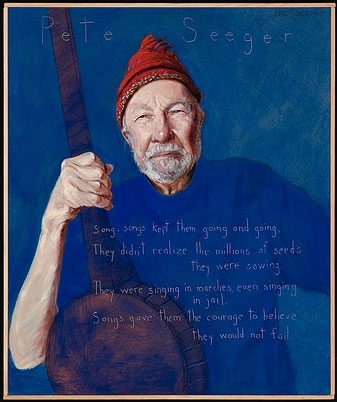 |
| HERO Pete Seeger (Americans Who Tell the Truth (Painted by Robert Shetterly) |
Who is your hero and why?
"My hero is Pete Seeger. I first heard him when I was 6 years old and was fortunate to talk with him at length when I was 17 and share the things that concerned me about the world. He very much directed me onto the path I followed and still follow. He helped me by intermittently talking with me about this work. He used to send me little notes with his banjo drawn by his name, signed simply, Pete. One of the things that makes him my hero is that he made music a joyful form of self expression and group expression throughout his career. He figured out a way to share his own musical abilities that did not make what he was doing any more important than what the audience would do with him. He understood that music was not a commodity and he shared it in that spirit."
If you had the attention of the world for 5 minutes what would you do or say?
She laughs. "I wouldn't say anything. I would teach a music lesson."
Immediate plans for future?
"I want to express this very complex model of creating educational reform and social change in concrete terms that the world of business can understand. GITC must make sense to people who want to put their money into something that can transform the quality of education and culture through a revival and restoration of music as a fundamental, natural human process. When people and foundations with the capacity to fund our model can find and understand it, there is hope to scale the work so more people have access. The need for music in education is vast but the potential to create a stronger and more vibrant society is even greater."
The MY HERO Project is pleased to be partnered with Guitars in the Classroom and Sing for Hope for the Sing for Hope Music Video Award, as part of the MY HERO International Film Festival. Click here to find out more.
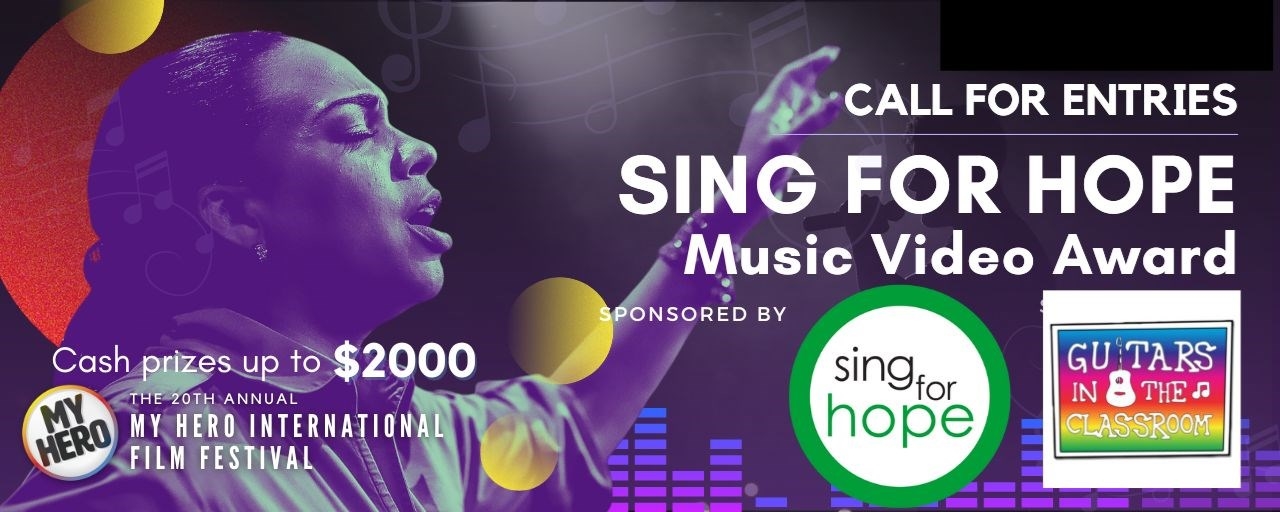
Page created on 5/9/2015 12:00:00 AM
Last edited 10/6/2024 6:07:27 PM
What teachers are experiencing and employing in their GITC classrooms:
* Renewed excitement about teaching
* A vehicle for demonstrating and encouraging courageous learning and sharing
* A powerful teaching modality that makes information stick
* A teaching medium that lends itself to individualizing instruction
*An innovative way to engage English Learners in oral learning without anxiety
* A teaching approach that includes all styles of learners in the lesson together
* A vehicle for helping children with special needs shine while constructively channeling their energies in a classroom setting
* A platform for cooperative and project based learning through student songwriting groups
* Personal fulfillment of an artistic dream that transmits hope and happiness to students
* A teaching modality that lends itself to all forms of cognitive process through song forms
* A method of instruction that presents immediate and constant evaluation of student comprehension
* A way to impart and support musical learning for students in cooperation with sequential music education.
